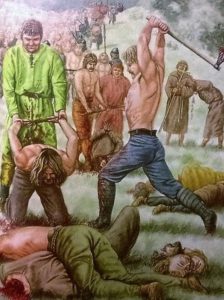Charlemagne’s bloody laws
During his struggle, the king issued draconian laws, evidently whenever he believed that he had finally subdued the Saxons and could bring them to ‘order.’ Notable in this respect are the Capitulatio departibus Saxoniae (782) and the Capitulare Saxonicum (797). And as conversions to Christianity were forced by mass baptisms, while the Saxon people secretly persisted in their paganism and abhorred the clergy, Charles imposed a complete change of ideological education based on the total eradication of ancient beliefs and their rites and by the forced baptism of all Saxons.
Of the fourteen provisions of the Capitulatio, which carry the death penalty, ten refer exclusively to crimes against Christianity. He had previously sought the advice of the pope and was clearly guided by the missionary method of the Fulda monks for the extirpation of paganism, which began with unceremonious mass baptisms and the total destruction of their shrines.
A stereotypical morte moriatur (die without remission) threatened everything the heralds of the good news wanted to erase: the plundering and destruction of churches, the cremation of the dead, the rejection of baptism, the secret avoidance of baptism, the mockery of Christianity, the undermining of church property, the offering of pagan sacrifices, the practice of gentile customs (emphasis added!—Ed.), and so on. This was its tenor:
• If anyone violently breaks into a church and steals anything from it, or sets fire to the church, let him die without remission.
• If anyone out of contempt for Christianity does not keep the sacred fast of forty days and eats meat, let him die without remission.
• If anyone, according to heathen custom, causes the body of a deceased person to be destroyed by fire and reduces his limbs to ashes, let him die without remission.
• If anyone in the future among the Saxon people pretends to hide without having been baptised and stops approaching baptism because he wants to remain a pagan, let him die without remission.
• If anyone in agreement with the heathen plots something against the Christians and seeks to maintain hostility against the Christians, let him die without remission.
Even the transgression of the precept of fasting carried the death penalty!
Baptism in the first year of life, church attendance on Sundays and feast days, the taking of oaths in churches and even the observance of the canon law on marriage were ordered. As Alcuin had already criticised, ‘severe penances were imposed for the slightest faults.’
Since the forcibly converted Saxon people cared little or nothing for Christianity, they had to continue to be forced to support the Church. Everyone, noble, free and common, had to give the Church a tithe for the harvest of their fields and all their earnings. In addition, each church was to get two rural estates, as well as one manservant and one maidservant for every 125 inhabitants, so that the mass of the Saxons was exploited as never before.
The aim of Charles’ war could hardly be stated more clearly and convincingly: the destruction of paganism, expansion of Christianity and annexation.
